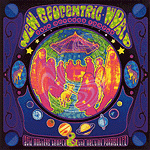 |
 |
|
|
|
| |||
 Acid Mothers Temple & the Melting Paraiso UFO
Acid Mothers Temple & the Melting Paraiso UFOThe New Geocentric World of... [Squealer; 2001] Rating: 8.9 Japan is a strange place for music, a cauldron of underground activity which continually threatens to bubble to the surface and vanquish the world of rock once and for all. Very few of these underground artists have made a name for themselves on American shores (Boredoms, Melt-Banana, Ruins), but the number of artists that continue to ply their craft continues to mount, all the while unbeknownst to us poor souls across the Pacific. At the forefront of this underground movement is guitarist Makoto Kawabata and the noise freaks of Acid Mothers Temple & the Melting Paraiso UFO (short for "Underground Freak Out"). A self-described "millennial hippy group," Acid Mothers Temple have been traveling the world, unleashing their particular brand of psychedelic bliss upon an unwitting public for four years. Releasing three albums early in their career on the Japanese underground label, PSF, the group slowly built a name for itself, specializing in what Kawabata termed "trip" music. It's a meltdown of entire genres and movements-- drawing equally from French folk and Western psychedelia-- all re-imagined in a form intended to liquefy your brain. Part of a community known as the Acid Mothers Temple Soul Collective, Kawabata and friends have been inhabiting the Japanese countryside and living out their own unique brand of utopianism for the last few years. Recalling the countercultural spirit of the 60's and other hippie communes, Acid Mothers even paid homage to that Californian group of restaurant-owning weirdos, Ya Ho Wha 13, with the album The Father Moo and the Black Sheep. But with this, their first release on Massachusetts' Squealer label, Acid Mothers Temple finally free the rein on their noise parade. I'm not sure if the Acid Mothers are trying to win any converts with their most recent offering, but the make-or-break point (if you will) for potential fans will undoubtedly come at 40 seconds into The New Geocentric World, as "Psycho Buddah" opens with the mantra, "What?," in a sound loop that teases the listener into thinking they've brought home some of that experimental locked-groove wankery. But a few seconds later, the Acid Mothers annihilate all preconceived notions. Dissecting the cacophony, the intense sonic war being waged on human ears, is futile. Best to sit back and let your brain bleed. I asked to hear this at the local record shop, and within one minute of the first track, people had either fled with fingers plugging their ears, or were completely rapt and entrenched within a new world of sonic dimensions. "Psycho Buddah" is unrelenting, moving at a furious pace for over 21 minutes and incorporating Kawabata's searing guitar work within the steady framework of the Acid Mothers' thunderous rhythm section. Cotton Casino, the group's only female, constantly pushes the gurgles, loops, drones and hisses of her synthesizer into the forefront. The song teeters on a hazardous precipice, looking over the edge and waiting to fall, but Kawabata's guitar is the anchor here, effortlessly able to rein all the others into his sonic realm. His ability to create deafening walls of feedback, hiss, and skronk, coupled with his penchant for tearing it all to shreds with a seething solo, is a thing of pure, unadulterated beauty. I'll say it right now: Kawabata is a guitar god. And these other guys are no slouches, either, as they prove while seamlessly incorporating bagpipes (!) and Jew's harps (!!) into this freeform freakout without ever looking back. The next track, "Space Age Ballad," is a haunting acoustic number that recalls contemporaries Ghost and their psychedelic balladry. Comparatively short at four minutes, this track is mere preparation for the slow-burning "You're Still Now Near Me Everytime." Guest vocalist Haco remains the focal point for the first minutes of the song until, at around the five-minute mark, Kawabata emerges with yet another guitar solo-- a trend on each track so far. A bit tiring? For your average indie rock band, yeah. But this is psychedelic madness, and the sheer joy and inventiveness with which Kawabata plays puts most of his contemporaries to shame, and his willingness to explore every possible dimension of sound succeeds with a creation of textures that seem wholly original. Unafraid to don their cartoon masks as well, Acid Mothers unveil their frenetic update on Hendrix's "Foxy Lady" with the scorching "Occie Lady," a pounding, speedfreak revision that subsumes Hendrix's riff within a mountainous din of thuds, screeches, and shrieking guitar. The closing track is a pure departure from everything preceding, abandoning the blistering guitarwork and crashing rhythm sections for a 15-minute drone workout. Here, Kawabata's guitar and the song's multi-layered structure evokes the theatrics of My Bloody Valentine and Spacemen 3. Acid Mothers Temple pride themselves on the drughead obsession of being "cosmic troubadours" in continual search for interstellar communication. But unlike the shoegazers with which their music has so much in common, Makoto Kawabata sincerely believes he's communicating with the cosmos. A strange guy to be sure, but most great musicians are given to some eccentricities. -Luke Buckman, October 3rd, 2001
|
|||

